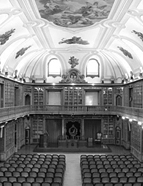

Modern times were «relegated to curiosity», when «all eras are worthy of historical consideration and lend themselves like the Middle Ages to circumspect and scientific examination» («Discursos pronunciados na cerimónia de doutoramento... » [«PhD ceremony speeches... »], Biblos, 9, 1933, p. 503). And in the Curso Superior de Letras, as early as 1901, the decreased weight of the Middle Ages in relation to antiquity and modernity was ordered.
The predominance of medieval studies in research involved the publication of sources, an aim that was extended to the Modern Age. This curious trend was handed down from the 19th century by historians who were not yet professionals, fostered by the suppression of the religious orders and the opening of the archives, in addition to the institutional activity committed to the collection of older sources. This line of action has been eagerly recovered by the current teaching staff.
In the 4th Cluster's historiographical activity, Economic and Social History were specifically absent from research until the 1960s. This line of research, as is known, was reshaped in 1928-1929 by the Annales d'Histoire Économique et Sociale, although Paul Mantoux (1877-1956), Henry Hauser (1866-1946) and Ernest Labrousse (1895-1988) were the precursors of Economic History in France, while in Portugal during the same period its initiators were Lúcio de Azevedo (1855-1933), Francisco António Correia (1877-1933), Moses Amzalak (1892-1978) and Costa Lobo (1840-1913), mainly in relation to the social side.
The Annales, which did not follow a unique path, would open an offensive not only against professional historians but also, and as highlighted by Carreras Ares, against the philosophers of science, such as those of the Vienna Circle, by «subsuming an isolated case into general laws, as in any other science» (Razón de Historia, 2000, p. 226). However, it should be noted that the new historiography would only take hold in England and Germany long after the 1950s. Vicens Vives, in Spain, only truly encountered the historiography of the Annales in 1950.
March Bloch was known in Coimbra in the forties, which was a highly intense historiographical period for the 4th Cluster of the Faculty, driven, as was the case with other similar institutions, by the dynamics stemming from the commemorations of the double centenaries and Portugal's non-entry in the World War.
